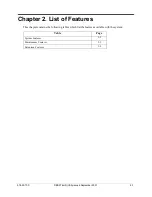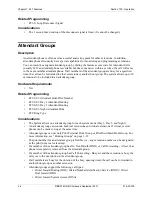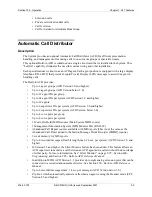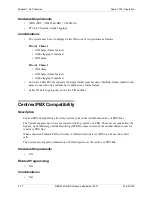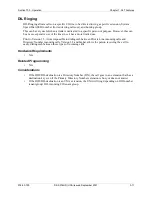
3-4
DBS 576HD (USA) issued September 2001
576-50-700
Chapter 7. SLT Features
Section 700 - Operation
Related Programming
•
FF3-0: Loop Disconnect Signal
Considerations
•
The 1 second time duration of the disconnect signal is fixed. (It cannot be changed.)
Attendant Groups
Description
An attendant phone is often used as a central answering point for other extensions. In addition,
attendant phones frequently have special capabilities for monitoring and programming extensions.
You can reach the assigned attendant group by dialing the feature access code for Attendant Calls
(usually 0). If an attendant phone is available but does not answer within a set time, the call will move
to the next available attendant phone. If all members of the attendant group are busy for a specified
time, the call can be forwarded to other extensions or another hunt group. The system allows up to 20
extensions to be included in an attendant group.
Hardware Requirements
•
N/A
Related Programming
•
FF5-0-01: Attendant Hunt Pilot Number
•
FF5-0-02: Day 1 Attendant Hunting
•
FF5-0-03: Day 2 Attendant Hunting
•
FF5-0-03: Night Attendant Hunt
•
FF2: Ring Type
Considerations
•
The System allows one attendant group for each system mode (Day 1, Day 2, and Night).
•
An attendant group can contain both real extensions and virtual extensions. If virtual, several
phones can be made to ring at the same time.
•
Attendant groups can use only Pilot Terminal Hunt Group or Pilot Distributed Hunt Group. For
more information, see “Hunting Groups” on page 3-33.
•
The pilot number for an attendant group is flexible (i.e., any extension number can be designated
as the pilot [not a real extension]).
•
If a member of the attendant group has Do-Not-Disturb (DND) or Call Forwarding - All set, that
phone is temporarily removed from the attendant group.
•
If a member of the attendant group has Call Forwarding - Busy set and the extension is busy, the
call goes to the next phone in the attendant group.
•
If all members are busy for the duration of the busy queuing timer, the call can be forwarded to
another hunt group or another extension.
•
Attendant groups support the following call types:
• Direct Inward Dialing (DID) / Dialed Number Identification Service (DNIS) / Direct
Dial Inward (DDI)
• Direct Inward System Access (DISA)






